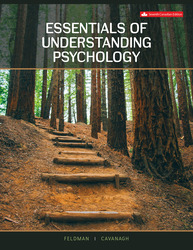At a Glance
Institution:
Dawson College
Instructor:
Melanie Doyle
Course Name:
Introduction to Psychology
Course Material in Use:

Feldman, Essentials of Understanding Psychology, 7ce
Resource in Use:
Connect + SmartBook
Course Type:
Face-to-face
Integration:
Sakai
Course Enrollment:
120 1st year students

Before using Connect, Professor Melanie Doyle found it challenging to get students to complete the assigned readings before coming to lectures. As a result, class participation and discussion became difficult, and often in-class activities needed to be altered on the fly. These constant changes to course content only served to reinforce the notion that students didn’t need to be ready for class ahead of time and penalized the students who actually came to class having completed the homework.
For years Professor Doyle considered finding a learning technology that would help her students stay accountable for their pre-lecture readings. With Connect, she finally found a solution that met her specific needs.
“I haven’t used other technologies because they couldn’t offer me the level of granularity I required for my courses. We rarely teach a whole chapter, so the technology needs to be advanced enough so I can get down to specific concepts and theories, by page if necessary, and control what I wanted to include or exclude.”
Professor Doyle began using SmartBook, an adaptive reading solution available in Connect for her Introduction to Psychology courses in Fall 2019. After seeing increased student success in her Introduction to Psychology courses, she switched to Connect for her Developmental Psychology courses as well.
In her Introduction to Psychology course, she allocates a total of 30% of student grades to Connect content including marks for SmartBook chapter readings to be completed before each lecture. She also assigns quizzes developed from the question bank available in Connect and Power of Process activities to help students become more familiar with Psychological Research.
“By completing the Smartbook readings before class, students earned grades for something they would have done anyway, but SmartBook kept them on track. This allowed them to space out their study time and kept them from cramming several weeks’ worth of readings into a few days before the exam.”
Professor Doyle found it easy to implement Connect into her course. Her dedicated McGraw Hill representative walked her through the textbook, concept by concept, and helped build the course to suit her needs. Near the start of class, Professor Doyle and the McGraw representative connected to ensure she was comfortable using the platform and answer any of her questions. On the first day of class, her representative also took her students through a demo of how to use Connect, answering any questions they had.
“Everyone I've talked to at McGraw Hill, right from my rep to the marketing managers, have continued to stay in touch with me, checking in, making sure everything is OK. If this isn't 1st class service, then I don’t know what is.”

Using Connect significantly elevated the level of student engagement and discussion in Professor Doyle’s courses that had not existed before. After using Connect for a semester, 58% of students indicated in a poll that they believed Connect improved their grades! Beyond this, Professor Doyle saw an 8-10%, or a whole letter grade, increase in student results after using Connect.
She no longer reviews chapter content in lectures because she knows students are reading the material before class. This allows her to spend more in-class time clarifying any concept gaps students may have through activities and labs, leading to a richer learning environment and better student learning outcomes.
“I no longer lecture the chapter because I know students are reading the material before class. This allows me to spend more in-class time clarifying any concept gaps student may have through activities and labs. Overall, I’ve found this leads to a richer learning environment, resulting in better student learning outcomes.”
Melanie Doyle teaches in the Psychology Department at Dawson College. Her teaching interests include General Psychology, Peace, Sustainability, and Well-Being and designed courses in these areas. Over the years she helped develop Dawson’s Peace Certificate and participated in Writing in the Disciplines, which includes innovative approaches to writing instruction, critical thinking, and active learning in the classroom, with a focus on assignment design, learning objectives, and effective evaluation tools. All of this has allowed Melanie to challenge students to think critically of concrete ways they can make positive changes in their own lives, and those of others. Melanie received her BA in Psychology from Concordia University and Master’s in Educational Psychology from McGill University.


To make the implementation of Connect smoother and more effective for fellow instructors Professor Doyle shares her top tips:
- Leverage the resources available to you and gather ideas about “best practices.”
- Use your McGraw Hill team to access ideas.
- Ask for support from other instructors who teach similar courses so you're not reinventing the wheel.
- Assign enough grades to Connect so that students are motivated to use it. Assigning grades to a new product may seem risky, but you won’t see the full benefit of the technology until you adopt it into your course.
- Most students will benefit from the drill and practice they get in Connect, and that will outweigh the risks associated with a minority of students who may try to “game” the system. Those students will, in the end, be unsuccessful if they don’t leverage Connect for the learning outcomes it provides.
